Neither confronting a threat that doesn’t respect borders nor safeguarding an economy that is deeply integrated with the rest of the world can be done alone. Yet it remains far from clear that the US will subordinate its geopolitical rivalry with China to these vital objectives.
HONG KONG – As governments worldwide confront the terrible choice between saving lives from COVID-19 and protecting people’s livelihoods, economic indicators highlight the intensity of the dilemma. Unemployment has skyrocketed, trade has plunged, and the global economy is facing its worst downturn since the Great Depression. There is only one way to limit the pandemic’s economic fallout: Sino-American cooperation.
It is no secret that China and the United States have been at odds lately. Since entering the White House, US President Donald Trump’s administration has pursued an aggressive containment strategy, wielding trade barriers as its favorite weapon.Far from spurring a change of heart, the COVID-19 crisis seems to have deepened the Trump administration’s commitment to antagonism, to the point that blaming China for the outbreak appears to have taken precedence over protecting Americans. In its latest “Strategic Approach to the People’s Republic of China,” the Trump administration reiterated its reasoning: a supposedly “clear-eyed” assessment has confirmed China as a strategic competitor in economic, ideological, and national-security terms.The US does not, the document claims, “seek to contain China’s development,” and “welcomes cooperation by China to expand and work toward shared objectives.” But US engagement with China will be “selective and results-oriented,” always advancing US national interests.
As the US COVID-19 death toll climbs above 100,000, America has no greater interest than containing the coronavirus. And with more than 38 million unemployment claims having been filed in just nine weeks, limiting the pandemic’s economic costs must also be worthy of cooperation.Make no mistake: neither confronting a threat that doesn’t respect borders nor safeguarding an economy that is deeply integrated with the rest of the world can be done alone. Yet it remains far from clear that the US will subordinate geopolitical rivalry to these vital objectives.
On the contrary, just in the last month, the US Commerce Department implemented new tech restrictions targeting the Chinese giant Huawei, and the Senate passed a bill that could delist some Chinese firms traded on US exchanges. And, while acknowledging the “wide scientific consensus that the virus was not man-made or genetically modified,” US Secretary of State Mike Pompeo recently declared that “enormous evidence” showed that it originated in a lab in China.Amid acute emotional and economic trauma, the desire to identify and punish a culprit can certainly be tempting. For Trump, it has emerged as a central feature of his reelection campaign – and a useful way to avoid blame for his administration’s own failures in responding to the pandemic. But history shows the folly of this approach: policies intended to punish the losers of World War I set the stage for the Great Depression and eventually led to another world war.The stakes are just as high today. The pandemic has turbocharged dangerous political and economic trends, from nationalism to a digital divide among workers and businesses. Rising unemployment, together with the climate change-related natural disasters and disease outbreaks, will only exacerbate discontent.
Many governments hope that large-scale monetary and fiscal stimulus will be enough to save their economies. The International Monetary Fund estimates that developed countries have already committed to provide $9 trillion worth of fiscal support, with the US and Europe in the lead. In the US, the Congressional Budget Office projects a fiscal deficit of $3.7 trillion – 17.9% of GDP – in 2020.China, too, is relying on fiscal stimulus, though to a much lesser extent. Its efforts – centered on more than CN¥2.5 trillion ($350 billion) in cuts to taxes and fees faced by businesses and households – would raise its fiscal deficit only slightly, to 3.6% of GDP.Likewise, whereas the US Federal Reserve has unleashed unprecedented monetary loosening – expanding its balance sheet by nearly $3 trillion as of mid-May – the People’s Bank of China has not followed suit, preferring to press commercial banks to issue credit to businesses and local governments. In the first four months of this year, total renminbi-denominated loans rose by 10.7%, year on year. The sale of coronavirus bonds worth CN¥1 trillion should help to sustain local-government budgets.Despite these massive stimulus measures, America’s real GDP is expected to decline by 39.6% in the second quarter of 2020, and 5.6% for the year. This reflects an inconvenient truth: most monetary and fiscal policies address only temporary cash-flow problems. What the world needs is to re-tool the business and employment models for the post-pandemic era – and that will require massive investments at local, national, and global levels.
Unlike the US, China seems to recognize this. At the recent opening of the third session of the 13th National People’s Congress, Premier Li Keqiang set no GDP target for the year, indicating that the government will uphold its people-first approach. Li also vowed to work with the US to implement the “phase one” trade deal that was signed in January.The US needs to recognize that its escalating geopolitical rivalry with China makes little strategic sense. The last several decades have shown that global cooperation – especially on trade – is a viable win-win strategy, while trade wars and zero-sum geopolitical competition undermine prosperity for all.Beyond the bilateral strategic game, the US – as a longtime global leader – has a moral obligation to help the rest of the world avoid the COVID-19 depression trap, which is more dangerous and urgent even than the so-called Thucydides Trap. Judging by recent signals, we should not hold our breath
* Andrew Sheng, Distinguished Fellow of the Asia Global Institute at the University of Hong Kong and a member of the UNEP Advisory Council on Sustainable Finance, is a former chairman of the Hong Kong Securities and Futures Commission. His latest book is From Asian to Global Financial Crisis.
* Xiao Geng, President of the Hong Kong Institution for International Finance, is a professor and Director of the Research Institute of Maritime Silk-Road at Peking University HSBC Business School.
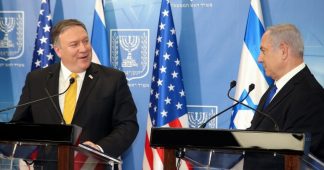
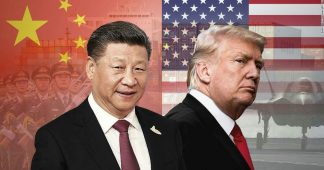
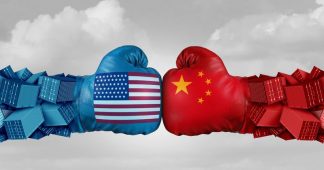
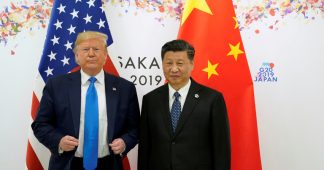
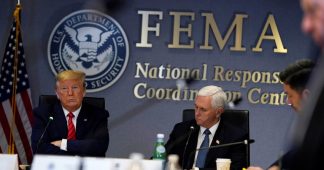
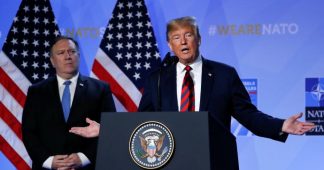






HONG KONG – As governments worldwide confront the terrible choice between saving lives from COVID-19 and protecting people’s livelihoods, economic indicators highlight the intensity of the dilemma. Unemployment has skyrocketed, trade has plunged, and the global economy is facing its worst downturn since the Great Depression. There is only one way to limit the pandemic’s economic fallout: Sino-American cooperation.
It is no secret that China and the United States have been at odds lately. Since entering the White House, US President Donald Trump’s administration has pursued an aggressive containment strategy, wielding trade barriers as its favorite weapon.Far from spurring a change of heart, the COVID-19 crisis seems to have deepened the Trump administration’s commitment to antagonism, to the point that blaming China for the outbreak appears to have taken precedence over protecting Americans. In its latest “Strategic Approach to the People’s Republic of China,” the Trump administration reiterated its reasoning: a supposedly “clear-eyed” assessment has confirmed China as a strategic competitor in economic, ideological, and national-security terms.The US does not, the document claims, “seek to contain China’s development,” and “welcomes cooperation by China to expand and work toward shared objectives.” But US engagement with China will be “selective and results-oriented,” always advancing US national interests.
As the US COVID-19 death toll climbs above 100,000, America has no greater interest than containing the coronavirus. And with more than 38 million unemployment claims having been filed in just nine weeks, limiting the pandemic’s economic costs must also be worthy of cooperation.Make no mistake: neither confronting a threat that doesn’t respect borders nor safeguarding an economy that is deeply integrated with the rest of the world can be done alone. Yet it remains far from clear that the US will subordinate geopolitical rivalry to these vital objectives.
On the contrary, just in the last month, the US Commerce Department implemented new tech restrictions targeting the Chinese giant Huawei, and the Senate passed a bill that could delist some Chinese firms traded on US exchanges. And, while acknowledging the “wide scientific consensus that the virus was not man-made or genetically modified,” US Secretary of State Mike Pompeo recently declared that “enormous evidence” showed that it originated in a lab in China.Amid acute emotional and economic trauma, the desire to identify and punish a culprit can certainly be tempting. For Trump, it has emerged as a central feature of his reelection campaign – and a useful way to avoid blame for his administration’s own failures in responding to the pandemic. But history shows the folly of this approach: policies intended to punish the losers of World War I set the stage for the Great Depression and eventually led to another world war.The stakes are just as high today. The pandemic has turbocharged dangerous political and economic trends, from nationalism to a digital divide among workers and businesses. Rising unemployment, together with the climate change-related natural disasters and disease outbreaks, will only exacerbate discontent.
Many governments hope that large-scale monetary and fiscal stimulus will be enough to save their economies. The International Monetary Fund estimates that developed countries have already committed to provide $9 trillion worth of fiscal support, with the US and Europe in the lead. In the US, the Congressional Budget Office projects a fiscal deficit of $3.7 trillion – 17.9% of GDP – in 2020.China, too, is relying on fiscal stimulus, though to a much lesser extent. Its efforts – centered on more than CN¥2.5 trillion ($350 billion) in cuts to taxes and fees faced by businesses and households – would raise its fiscal deficit only slightly, to 3.6% of GDP.Likewise, whereas the US Federal Reserve has unleashed unprecedented monetary loosening – expanding its balance sheet by nearly $3 trillion as of mid-May – the People’s Bank of China has not followed suit, preferring to press commercial banks to issue credit to businesses and local governments. In the first four months of this year, total renminbi-denominated loans rose by 10.7%, year on year. The sale of coronavirus bonds worth CN¥1 trillion should help to sustain local-government budgets.Despite these massive stimulus measures, America’s real GDP is expected to decline by 39.6% in the second quarter of 2020, and 5.6% for the year. This reflects an inconvenient truth: most monetary and fiscal policies address only temporary cash-flow problems. What the world needs is to re-tool the business and employment models for the post-pandemic era – and that will require massive investments at local, national, and global levels.
Unlike the US, China seems to recognize this. At the recent opening of the third session of the 13th National People’s Congress, Premier Li Keqiang set no GDP target for the year, indicating that the government will uphold its people-first approach. Li also vowed to work with the US to implement the “phase one” trade deal that was signed in January.The US needs to recognize that its escalating geopolitical rivalry with China makes little strategic sense. The last several decades have shown that global cooperation – especially on trade – is a viable win-win strategy, while trade wars and zero-sum geopolitical competition undermine prosperity for all.Beyond the bilateral strategic game, the US – as a longtime global leader – has a moral obligation to help the rest of the world avoid the COVID-19 depression trap, which is more dangerous and urgent even than the so-called Thucydides Trap. Judging by recent signals, we should not hold our breath
* Andrew Sheng, Distinguished Fellow of the Asia Global Institute at the University of Hong Kong and a member of the UNEP Advisory Council on Sustainable Finance, is a former chairman of the Hong Kong Securities and Futures Commission. His latest book is From Asian to Global Financial Crisis.
* Xiao Geng, President of the Hong Kong Institution for International Finance, is a professor and Director of the Research Institute of Maritime Silk-Road at Peking University HSBC Business School.